Geothermal definition
- Geothermal energy source is renewable and inexhaustible
Unlike fossil fuels, geothermal energy is present in all basements and in all climates. Its uses are varied, because it has a wide range of temperatures and depths. At shallow depth, at any point on the globe, associated with a heat pump, it is used for Heating and cooling of homes.
- A global availability
The heat present in the depths of the center comes even from the Earth, and is thus equally distributed to its entire surface. There is no good or bad geothermal site, the natural heat being all just available everywhere under our feet. The selection of the site will be based on the accessibility to these resources (composition of the basement, position on the surface, etc.).
Geothermal concept & applications
- What is a geothermal heat pump?
A geothermal or “ground-source” heat pump is an electrically powered device that uses the natural heat storage ability of the earth and/or the earth’s groundwater to heat and cool your home or business.
- How is heat transferred between the earth and the building?
The earth has the ability to absorb and store heat energy. To use that stored energy, heat is extracted from the earth through a liquid medium (water or an environmentally safe antifreeze solution) and is pumped to the heat exchanger, which then heats the building. In summer the process is reversed where indoor heat is extracted from the building and transferred to the earth through the liquid medium.
One of the things that make a heat pump so versatile is its ability to be both a heating and cooling system in one. The unit will change from one mode to another based on the room set-point or building management system.
Geothermal applications
These "Boilerless/Towerless" Heat Pump systems use the natural thermal properties of the Earth to dissipate or capture heat for the water loop. Geothermal Heat Pumps operate in an identical fashion to Water-Source Heat Pump units. However, without the need for a boiler or cooling tower, they save substantial energy costs and space. The water loop system is underground and the units are inside the building. Thus, the environmentally friendly geothermal system preserves the architectural design of a building naturally.
Geothermal Earth Loops
Geothermal Earth Loops come in different configurations depending on space availability and soil properties. Chances are at some point that you have either stood over, or walked across a geothermal loop field. Loop fields can be located under parking lots, landscaped areas, or any number of other locations. All earth loops use high-density polyethylene pipe to circulate either water or an antifreeze mixture. All joints and connection fittings are thermally fused to prevent leaks and most piping comes with a 25-year or longer warranty.
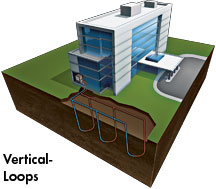 |
Vertical Loops Vertical loops utilize bore holes drilled to an average depth of 250 feet. Once the loop pipe is inserted into the bore, it is grouted using a Bentonite mixture for maximum thermal conductivity. When space is limited, vertical loops are the most common type of geothermal loops installed. |
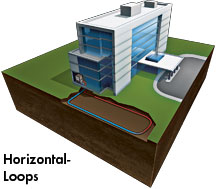 |
Horizontal Loops Horizontal loops utilize trenches dug to an average depth of four to six feet. As one of the most cost effective loops to install, horizontal loops are commonly found in open fields, parks or under parking lots. |
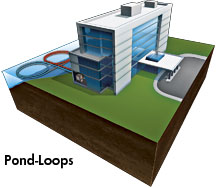 |
Lake Loops Lake loops utilize a "slinky" assembly of geothermal loop piping placed at the bottom of a pond, lake, or other large body of water. An extremely cost effective loop system, lake loops are an easy alternative if the option is available. |
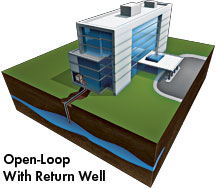 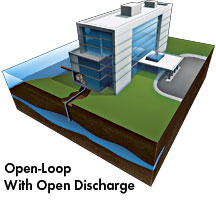 |
Open Loop (Well) Most commonly known as "Open Loop", well systems pump water out of a nearby body of water or water well, and then discharge the water into another body of water or water well. Well systems usually employ a plate heat exchanger inside the building to keep the building water loop separated from the well water. This prevents any contaminants from affecting unit performance and extends system life. Well systems are often the most efficient as the well water is always at the same temperature year-round. |
Source: www.climatemaster.com

